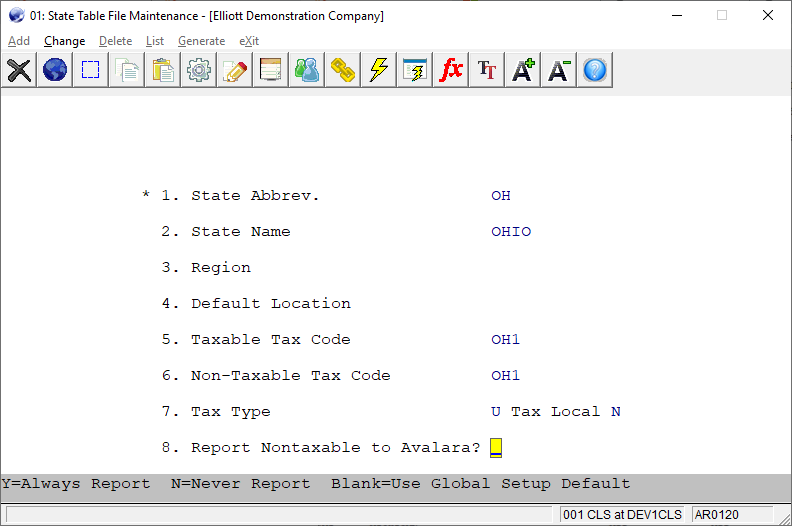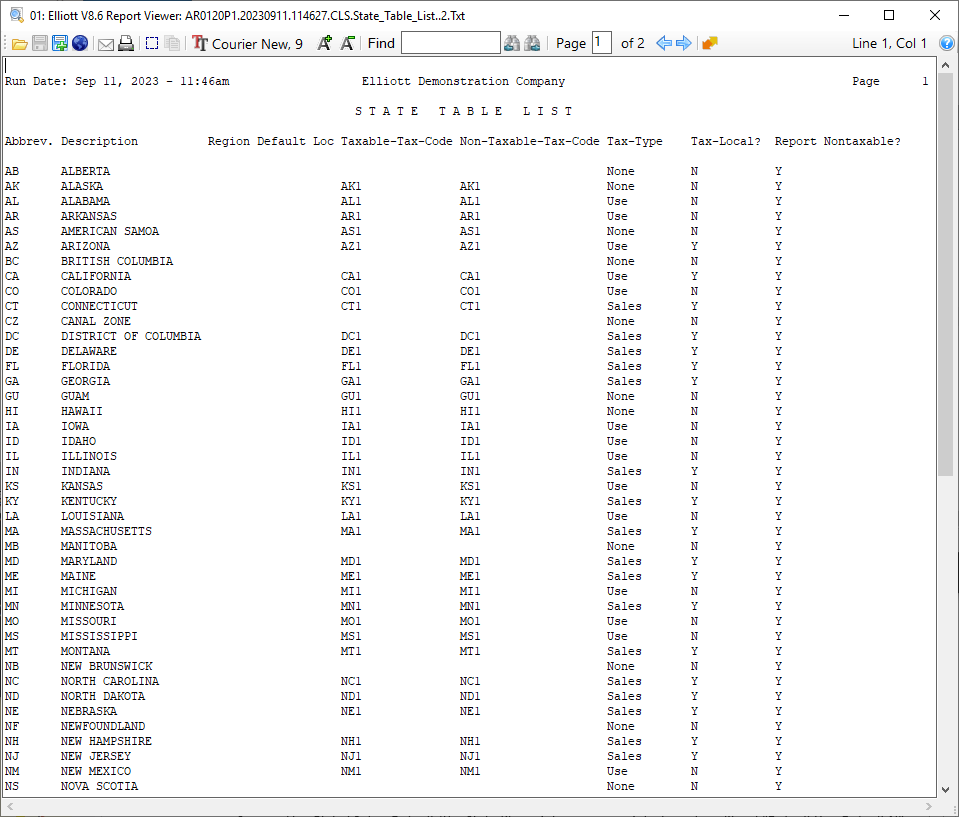Avalara - State File Maintenance
Date Released: 4/28/23


Version: 8.6 and Above
Revised: 9/11/23
After running
Create/Update State Tax Codes (System Utilities -> Global Setup -> Utilities-> Avalara Utilities-> Utilities-> Create/Update State Tax Codes) the tax type and the tax local fields in the state file are updated based upon the "Where you collect tax" setting in your Avalara administrative settings.
7. Tax Type: Valid options are N=None, S=Sales Tax(Physically Present) and U=Use Tax(Nexus But Not In State). The default value is "S." When set to "S," sales tax rates will be used when estimating sales tax. When set to "U," use tax rates will be used when estimating sales tax. If the warehouse location is the same state as the ship-to state and the tax type is set to "U," taxes will be estimated with the sales tax rates instead of the use tax rates.
Tax Local shows how city and district taxes will be handled when use taxes are calculated by Avalara.
8. Report Nontaxable to Avalara? - Valid options are Y=Always Report N=Never Report Blank=Use Global Setup Default. Default is blank.
The fields are printed on the State Table List.
The nexus fields are updated based up values set up in the Admin section of Avalara's web site.
Users can update the fields manually. For example, let’s say Colorado has a nexus rule of $500,000. If an Elliott user does not sell over $500,000 to Colorado, then that user does not need to collect use tax for Colorado. Hence, that user will override the default value “U” in the Tax Type field for state “CO” to “N”. However, the next time the fields are updated using the Create/Update State Tax Codes application. To set this up correctly, the user should set Avalara to Sales Tax Only in the ADMIN application.
Programs Modified: AR0120, AR0120P1, STATEFIL.FD
CLS
Related Articles
Avalara Design Principles
Release Date: 4/28/23 Date Revised: 10/4/23 Version: 8.6 and Above Issues Related to Running Versions 8.5 and 8.6 Side by Side While we allow users to run versions 8.5 and 8.6 side by side, if users turn on the Avalara interface then applications ...Avalara Setup Procedures - Elliott Configuration
Release Date: 4/28/23 Version: 8.6 and above Revised: 9/11/23 Elliott Configuration After installing Elliott V8.6 for the first time, you will need to make some configuration changes. Bring up <ElliottRoot>\Bin86\EL860CF.exe utility or alternatively ...Avalara Setup Procedures - Updating Elliott Tables
' Release Date: 4/28/23 Version: 8.6 and Above Updating Elliott Tables Generate States Table If you do not have state table setup yet, go to Accounts Receivable-> Maintenance-> State File -> Generate The system comes with a pre-defined table of all ...Feature - Report Nontaxable Documents to Avalara
Release Date: 9/11/23 Version: 8.6 and Above This feature allows the user to choose if non-taxable orders are processed through Avalara for tax calculations. A new option is available in Global Setup-> Add-ons-> Avalara Sales Tax Interface-> 15. ...AR0120 Accounts Receivable State Table File Maintenance
State Table File Maintenance Application Overview The purpose of this program is ensure correct state abbreviations for address and shipping accuracy. For example, is Alaska AL or AK? Is Montana MO or MT? Run Instructions The system comes with a ...